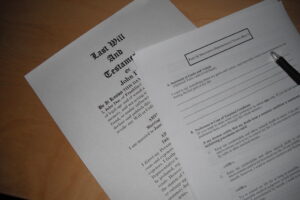It is possible that you will need to make changes to your Will at some point. Can a will be changed? Making a Will ensures that one’s property is distributed as desired. And that the appropriate heirs receive their fair share. A Will is a legal declaration of the testator’s intention regarding his property that he wishes to be carried out after his death.
When a major life event occurs, such as marriage, divorce, separation, the birth of a child, the death of a relative, or a change in your financial situation, it is critical to review your Will. These events may have an impact on both your estate distribution wishes and the validity of your current Will.
A testator has the ability to alter his or her Will.
A testator has the right to change his Will at any time and in any way he sees fit. A Will can be made by anyone of sound mind who is not a minor. If a person is not of sound mind when making a Will, the Will is unenforceable.
A Will obtained by force, coercion, or undue influence is a void Will because it removes the person’s free agency. A will made under the influence of intoxication. Or in such a state of body or mind as to deprive the testator of free agency is null and void.
A Will can be written at any point in a person’s life. A testator may make a Will as many times as he or she wishes. However, only his last Will and Testament made before his death is enforceable. A Will must be signed or affixed with the testator’s thumb impression before it can be executed. It must be attested by two or more witnesses, each of whom must have witnessed the testator signing the Will.
Wills are registrable –
Although the registration of a Will is not required, it can be done with the sub-registrar. If the testator wishes to withdraw the Will at any time, he may do so. A Will can also be sealed and kept in a safe place. An executor of the Will or an heir of the deceased testator can apply for probate after the testator’s death. The court will then ask the deceased’s other heirs if they have any objections to the Will. If no objections are raised, the court will grant probate. A probate is a court-certified copy of a Will that serves as conclusive evidence that the Will is genuine.
A will can be changed due to factors like :
1. Civil Partnership/Marriage
Any previous Will that you may have made is automatically revoked when you marry. The only exception is if your Will expressly states that a marriage is about to take place. And includes explicit instructions that the Will will continue to be valid after marriage and will be changed
Members of a Civil Partnership have been treated in the same way as married couples since the Civil Partnership Act was passed in December 2004. When a civil partnership is registered, any previous Will made by either partner is automatically revoked.
2. Separation or Divorce
If you divorce or dissolve your civil partnership, your Will remains valid. However, many of its provisions will no longer be effective if you die before making a new Will. For example, any gift you left to your former spouse or civil partner in your will would take effect as if they had died on the date your divorce was finalised.
This usually means that the gift is returned to the estate residue for the benefit of the residuary beneficiaries. If your Will specifies that everything goes to your spouse. It is the same as if you died intestate and a will be changed(leaving no valid Will).
3. A child is born.
Even if you name your other children as beneficiaries, if you have a child after writing your Will, they will not automatically become a beneficiary. As a result, you should update your Will and a will be changed as soon as possible after the birth of a child to ensure that your wishes are carried out.

How to Modify Your Will?
You cannot simply make changes to an existing Will in order to change it. Such alterations are presumed to have occurred after the Will was executed and a will be changed. Thus, do not constitute a part of the original legally valid Will.
- The only way to legally change a Last Will and Testament is to either add a codicil to the existing Will or
- Create an entirely new Will.
Using a Codicil to Modify a Will
A codicil is an addition to an existing Will that makes some changes while leaving the rest of the Will untouched. It is a legal document that has the same legal force as the original Will.
A codicil must be signed, dated, and witnessed in the same manner as the original Will on a separate sheet of paper. The witnesses, however, do not have to be the same as in the original Will. There is no legal limit to the number of codicils that can be added to a Will. But they should only be used for minor and straightforward changes.
After the codicil has been executed, it should be kept in a safe place with the original Will. It is suggested that codicils be numbered so that executors know how many documents to consult in addition to the Will. Do not attach the codicil(s) to the Will, as doing so would render the Will null and void. It is best to notify your executor(s) and provide them with the location of the codicil.
Changing a Will After Someone Has Died
It is possible to change a person’s Will regarding the distribution of their assets if they die with or without a valid Will. In some cases, beneficiaries may find it advantageous to change a Will and a will be changed for tax purposes after the deceased’s death. This can be accomplished through the use of a Deed of Variation, also known as a Deed of Family Arrangement.
This must happen within two years of death and only if all of the beneficiaries agree to the changes. A Deed of Variation must be in writing and signed by the beneficiaries agreeing to the changes. And if more tax is payable as a result of the Deed, the Deed must be in writing and signed by the beneficiaries agreeing to the changes. The executors will be required to sign the document as well.
The following are the most common reasons for changing a Will after death:
- To reduce the amount of Inheritance Tax that must be paid.
- Provide for someone who has been left out of a Will or who has not been adequately provided for in a Will (such as new grandchildren).
- To make provision for someone who has a legal claim to the estate.
- Redirect a joint tenancy property that would otherwise pass to the surviving joint tenant.
- To clear up any doubts or flaws in the Will.
To be valid and effective, a Deed of Variation must include significant changes to the way assets are to be distributed. It is not legal to transfer assets on paper to another person while the original beneficiary continues to benefit from them. Spouses cannot pass assets to their children and then pass them back to the parent to avoid inheritance tax charges. When establishing a Deed of Variation, there should be no reciprocity at all.


